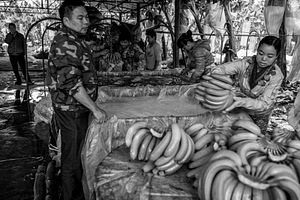Luc Forsyth and Gareth Bright have set out on a journey to follow the Mekong river from sea to source, The Diplomat will be sharing some of the stories they’ve found along the way. For more about the project, check out the whole series here.
After spending several days in the town of Simaogang documenting the dredging of the Lancang’s sand, a surprise invitation allows us to discover the workings of Yunnan’s banana industry.
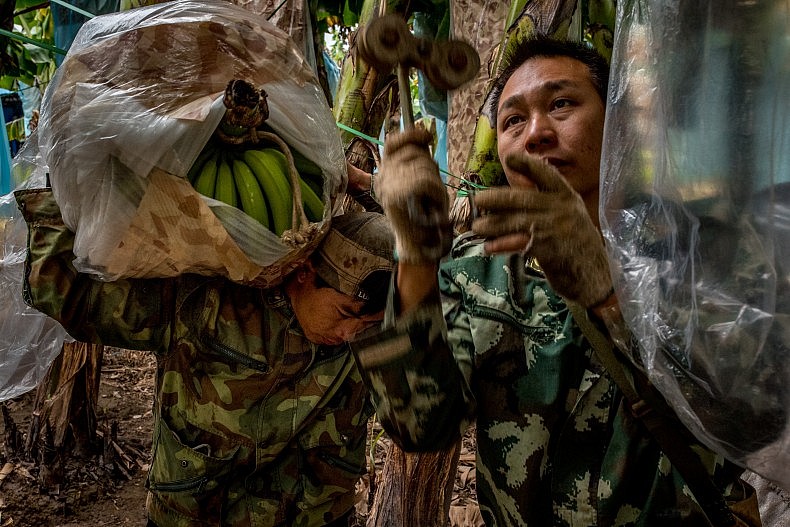
Workers harvest bananas on a plantation in Mengkwang village, Yunnan, China. Photo by Luc Forsyth.
When we piled into the tiny boat that shuttled passengers across the Lancang between Simaogang and Mengkwang villages, we thought we were setting out for a walk in the mountains. But as had happened so often on this journey, the day had other plans for us.
“We’re all going to pick bananas,” one of the other passengers said, “why don’t you join us?”
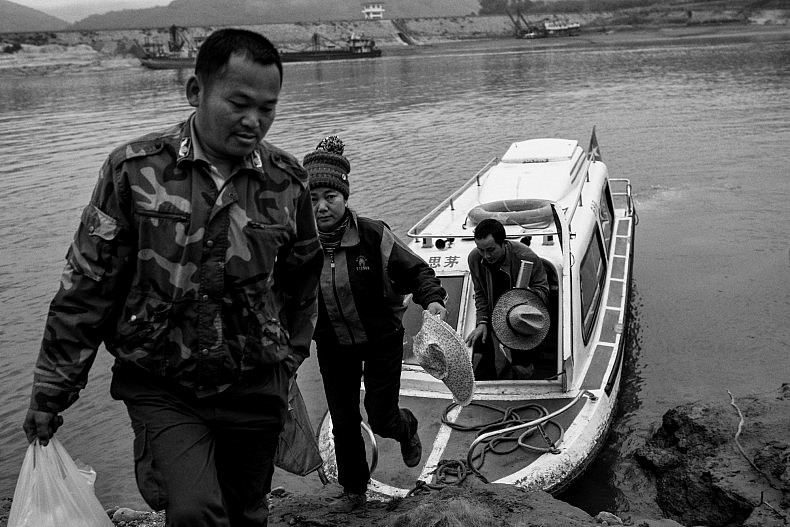
Passengers climb out of a small ferry that moves between Simaogang and Mengkwang villages in Yunnan, China. Photo by Gareth Bright.
We’d seen the vast plantations lining the river banks during the several days we’d spend documenting the process of dredging sand from the Lancang, and had already decided to have a look at them eventually, but the unexpected invitation changed our timeline.
We could see lengths of pipe running from the rows of banana trees to the river below, so we knew that there was a connection between the water and the fruit. And since we’d decided at the project’s inception that we would remain flexible to whatever opportunities presented themselves and not adhere too rigidly to any sort of schedule, accepting the invitation seemed like the only sensible thing to do.
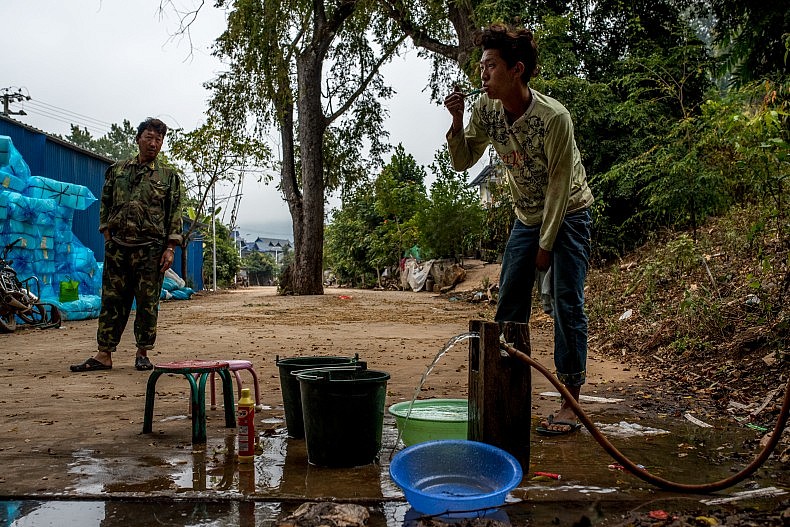
Banana factory workers rise in the early morning to begin work in the village of Mengkwang, along the banks of the Lancang (Mekong) river. Yunnan, China. Photo by Luc Forsyth.
Picking Season
“We can only pick for half the year,” a worker said as we walked through the outskirts of the plantation, “so you came at a good time.”
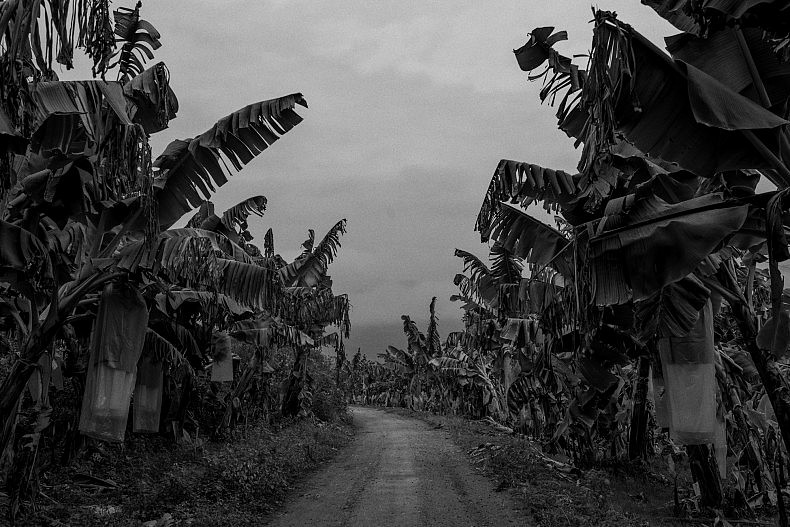
Banana plantation Mengkwang village, Yunan, China. Photo by Gareth Bright.
After another 10 minutes of walking, the trees parted to reveal a sheet metal shed that served as a bunk house for workers that had no homes in the nearby village. The sun was still not yet fully above the horizon, and once the sleepy workers had gotten over their surprise at seeing two foreigners emerge out of the gloom, they returned to their morning routines. Some brushed their teeth in silence using water from a tap that gushed fresh mountain spring water (water from the Lancang was good for watering crops, they said, but too dirty for human consumption) while others sat wrapped in blankets sipping tea and eating steamed dumplings. The atmosphere was more like a large extended family waking in their shared house than a job site, and it seemed as though this group had been together for some time.
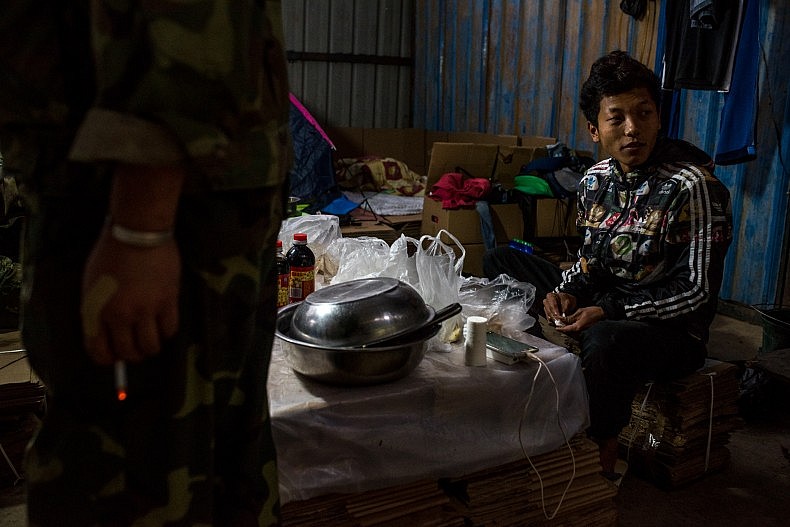
The small community of banana plantation workers had the vibe of an extended family. Photo by Luc Forsyth.
“This is collective work,” said a young manager named Wang Jing. “We move between plantations when there is picking [to be done], and we get paid based on how many trucks we can fill in a day. The price per truck is 100 Yuan (around $15 USD at current rates), and in a good day we can do 1.5 trucks.”
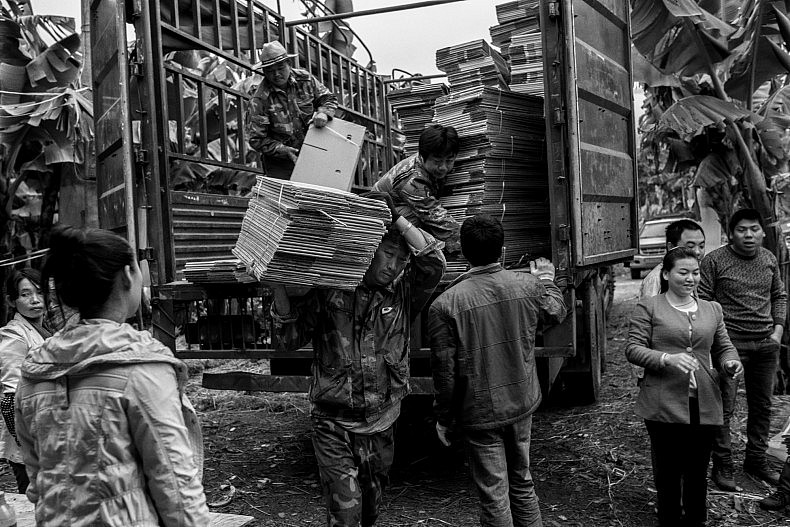
Workers load collapsed cardboard banana boxes on to a truck in Mengkwang village, Yunan, China. They will be assembled and packed at a nearby fruit processing facility. Photo by Gareth Bright.
By 8 a.m. the morning’s eating and grooming had finished. A large open topped transport truck reversed into the clearing and the whole team sprang into action, loading it with tightly wrapped bundles of straw from a storage building attached to their living quarters.
“It’s cold now, so we have to cover the bananas when they are transported,” Wang said in explanation.
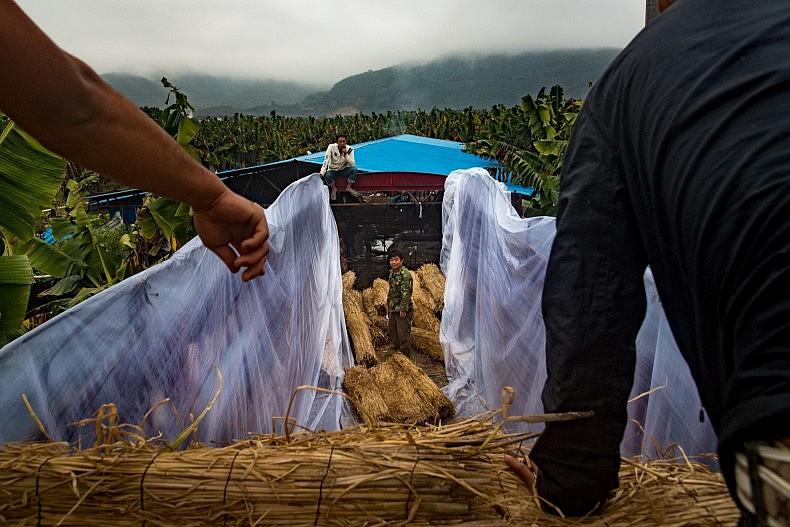
Plastic and straw insulation lines a transport truck to keep bananas warm during transport. Photo by Luc Forsyth.
Once the truck had been filled with enough straw, the workers jumped on board for the ride to the plantation. A few minutes later–no one seemed to mind being tossed around violently as the vehicle bounced over holes in the narrow dirt road–the truck arrived at the plantation’s central packing house and the team spread out to their various stations.
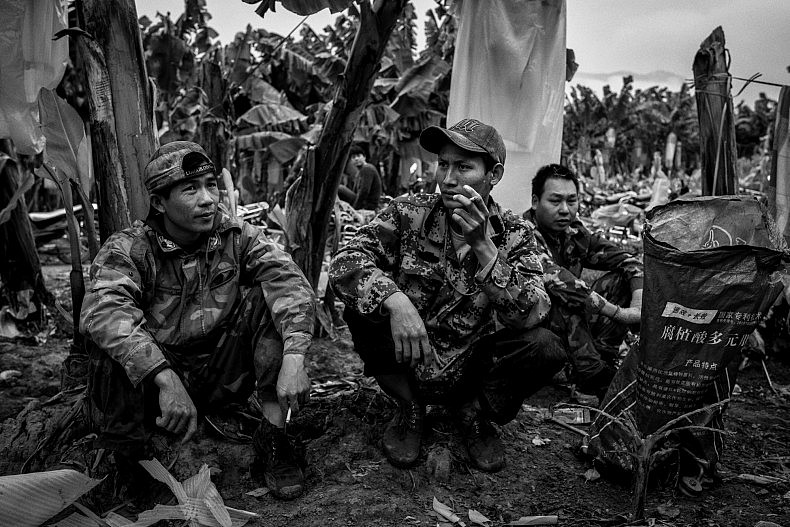
The men exclusively wore military style camouflage jackets as they trudged off into the plantation. Photo by Gareth Bright.
The pickers, exclusively men who wore military style camouflage jackets, fanned out into the tree line and we struggled to keep up, stumbling repeatedly on the uneven ground. The trees were heavy with bananas, the bunches wrapped in layers of insulation and plastic to keep them protected from the cold and hungry insects. The fruits inside were perfect looking (albeit not yet ripe), the textbook image of what a banana should be shaped like.
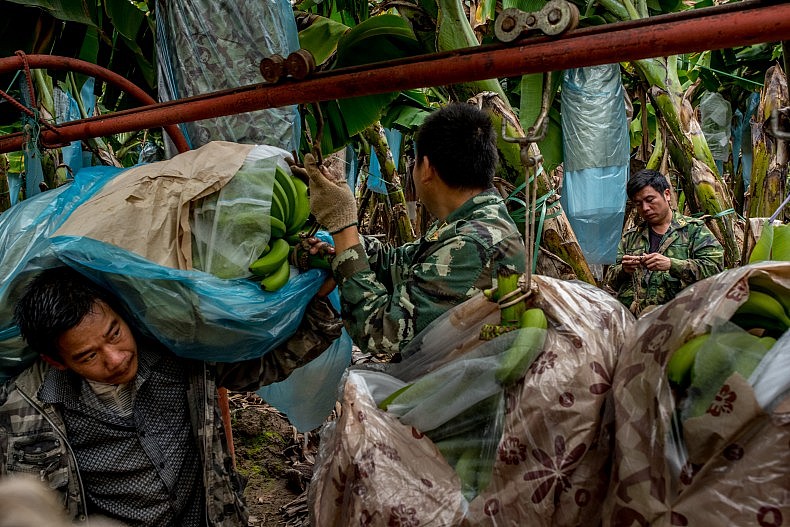
The bananas are wrapped in plastic to keep out bugs and for insulation against the cold. Photo by Luc Forsyth.
By contrast, those few bunches that were not wrapped in the plastic had been ruined by the winter air. Shriveled and pathetic looking, mottled with black spots, and a fraction of the size, they did not look fit for the shelves of the world’s supermarkets and the demanding preferences of the modern shopper.
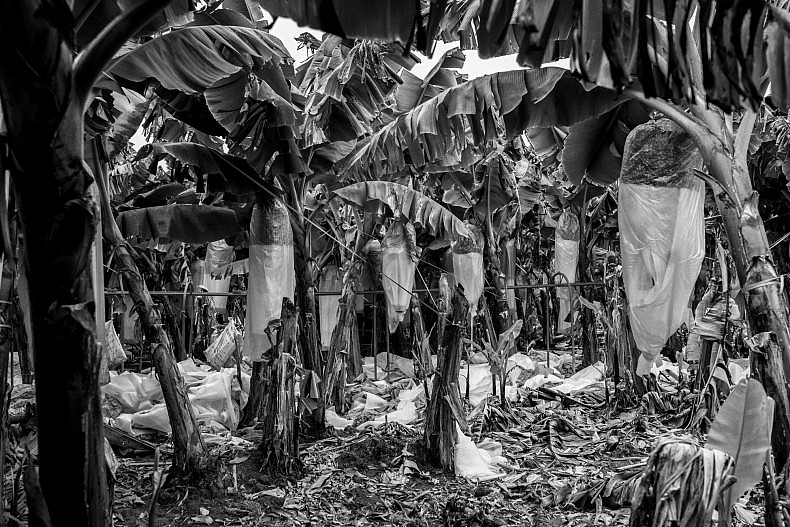
Banana trees in Yunnan. Photo by Gareth Bright.
Though the mechanics of getting the bananas from the trees were simple, the strength and stamina of the pickers was impressive. For every 10 men, one was equipped with long shaft of wood tipped with a dangerous looking curved blade. The men readied themselves under the low-hanging bunches, testing the weight on their shoulders, and then called out for a cutter who would appear instantly to hack deftly at the tree until the fruit fell free. Pausing only for a moment to get their balance, the men sped away with the 25 kg loads, showing no outward signs of strain.
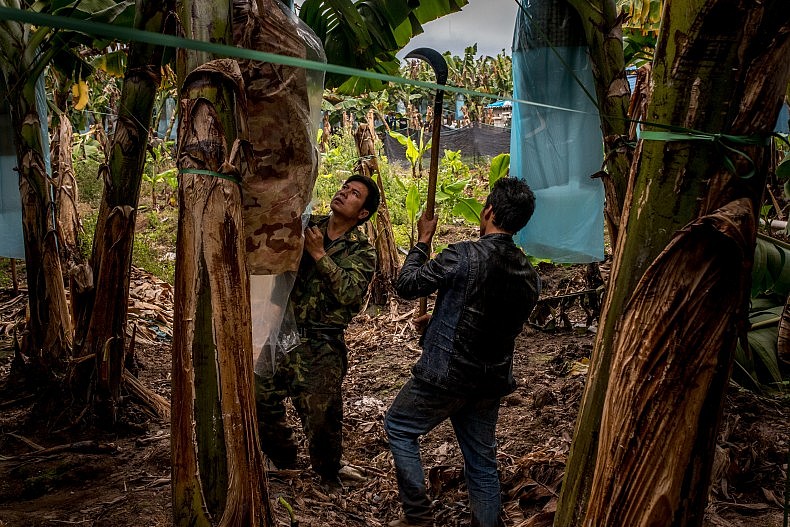
On call, one of the workers comes over to hack down the banana bundle. Photo by Luc Forsyth.
A network of metal arches joined by a greased rail snaked through the plantation, and the senior man on the crew stood by with inverted hooks mounted to a base of small wheels that fitted onto the track. One by one the men attached the heavy bunches to the hooks and after hearing a monosyllabic bark from their foreman, let their burdens drop to sway beneath the rail. Periodically the bunches were pushed forwards along the track, which wound its way through the rows of trees until eventually reaching the packing shed.
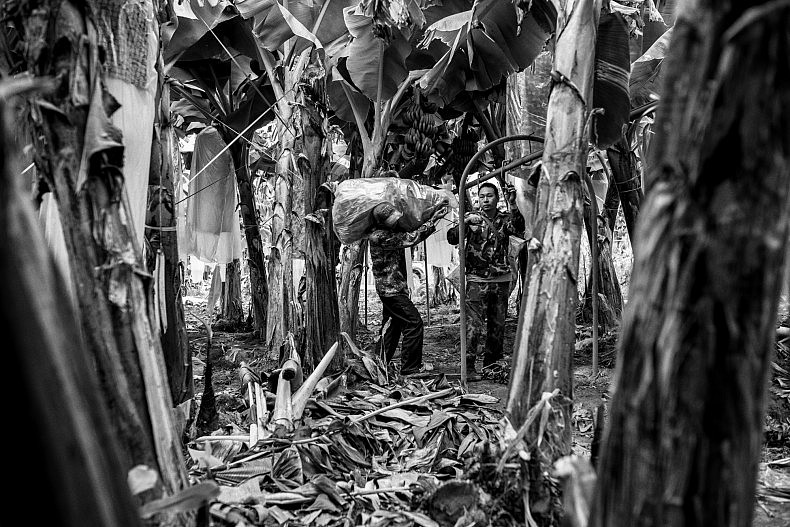
The banana bundles are hooked to a metal track and pulled in for processing. Photo by Gareth Bright.
Stopping once an hour for a five minute cigarette break, and for an hour at lunch, the team otherwise worked without interruption from sunrise to sunset. As we rarely lifted anything heavier than a camera for any length of time, we were more than a little impressed by their endurance.
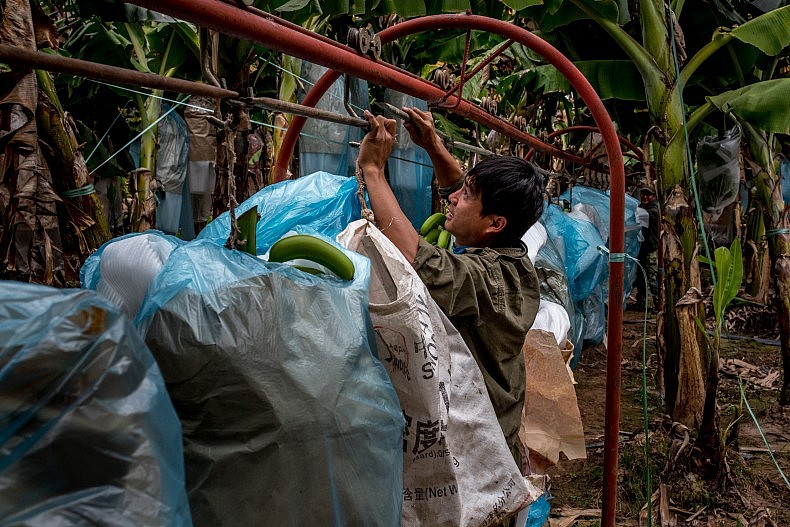
Banana bundles are transported to the pack house. Photo by Luc Forsyth.
Artificial Perfection and the Cycle of Trade
As the bananas arrived at the pack house, the place buzzed with activity. In one corner a group of young women worked robotically to assemble cardboard boxes that would hold the bananas for their trip to market, wielding their industrial tape guns with practiced speed. The bulk of people, however, had formed into an assembly line to process and pack the fruit before loading it onto a waiting truck.
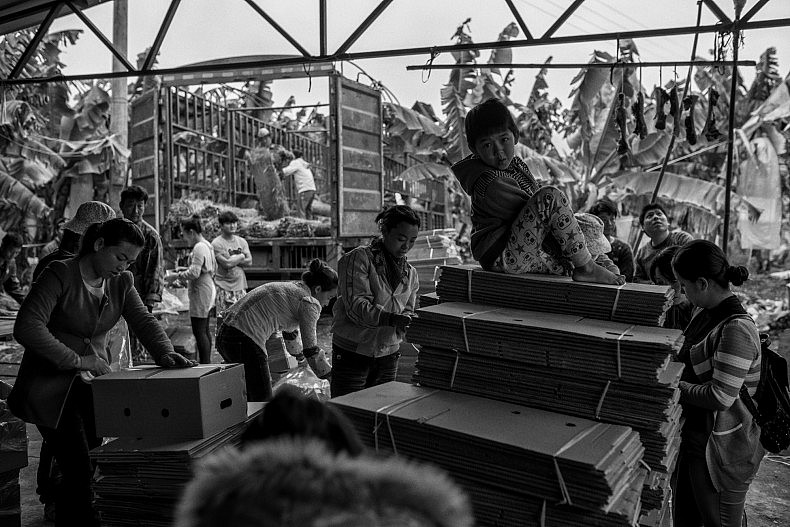
Workers assemble cardboard boxes to be filled with bananas. Photo by Gareth Bright.
As soon as the bananas were pulled from the track, they were set upon by knife-wielding workers who hacked the bunches into manageable sections. These were passed down the line to others who had donned thick rubber gloves before submerging them in a noxious grey-tinted chemical bath.
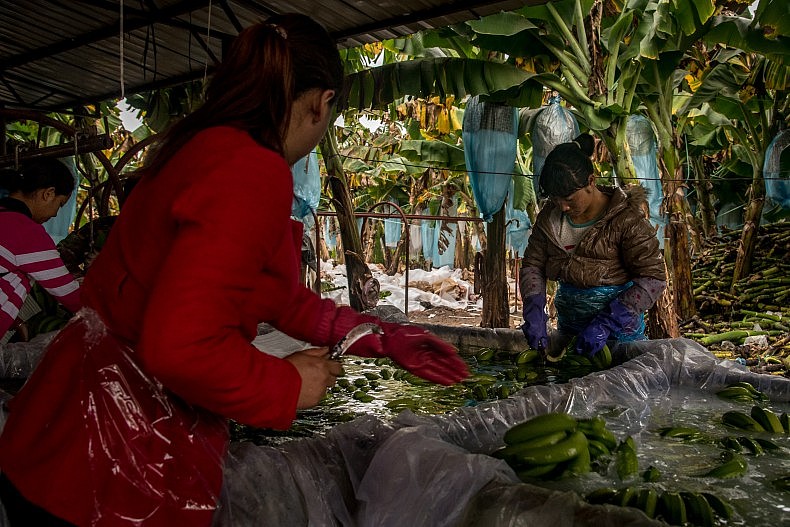
Bananas are given a chemical bath to speed up the ripening process. Photo by Luc Forsyth.
“It makes them turn yellow,” Gao Yanhong, the owner of the factory had told us after seeing our confusion. We’d watched several men that morning empty packets of an unknown powder into the tubs, but hadn’t understood their purpose until now. As with most fruit destined for far away consumption, the bananas were picked prematurely and were still a deep green color. But green bananas are harder to sell than vibrant yellow ones, and the chemicals ensured that by the time they reached the urban supermarkets near Beijing they would have transformed to meet the taste of buyers.
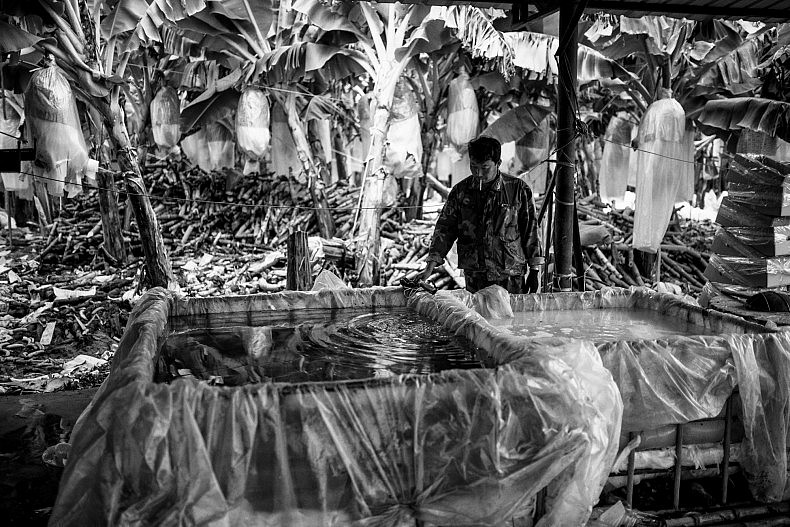
The chemical bath quickens the ripening process so the bananas are yellow by the time they hit market. Photo by Gareth Bright.
While we too were guilty of preferring yellow bananas to green ones, and had come to expect near perfection from the produce we bought, this was a part of the agricultural process that we wished we had not seen. We had no idea what chemicals were being used, but we resolved to wash our fruit more carefully in the future.
Shining and wet from their ripening bath, the bananas were then placed into boxes bearing the elephant logo of the fruit company and stacked in the bed of the truck. When full, five or six hours later, the truck would depart for the megacities of the east.
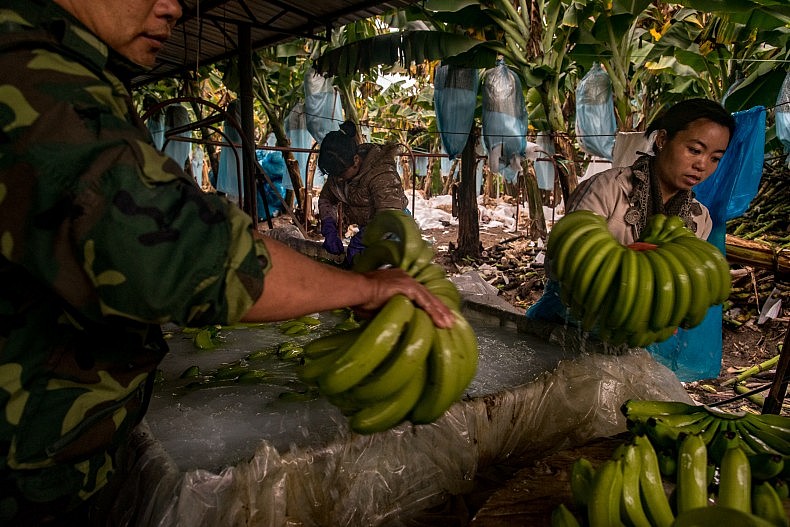
After their bath the bananas are packed into boxes and put on the truck. Photo by Luc Forsyth.
In fact, the cycle of transport was surprisingly complex. These bananas, which began their life in the small village of Mengkwang, watered by the blue-grey water of the Lancang, were destined for Shanxi province, located just to the west of Beijing, nearly 3000 km away. Once the bananas were offloaded in Shanxi, the truck was refilled with apples, which do not grow well in the hotter provinces to the southwest. Then, 1200 km to the south, the apples were sold in Hunan province and the truck loaded once again, this time with oranges. The oranges then traveled more than 1300 km to Kunming, the largest city in Yunnan province, where the cold winters prevented the large-scale growing of citrus fruits. With this cargo safely offloaded, the truck drivers would then collect local mail from the post offices of Kunming before returning once again to Mengkwang to start the cycle over again.
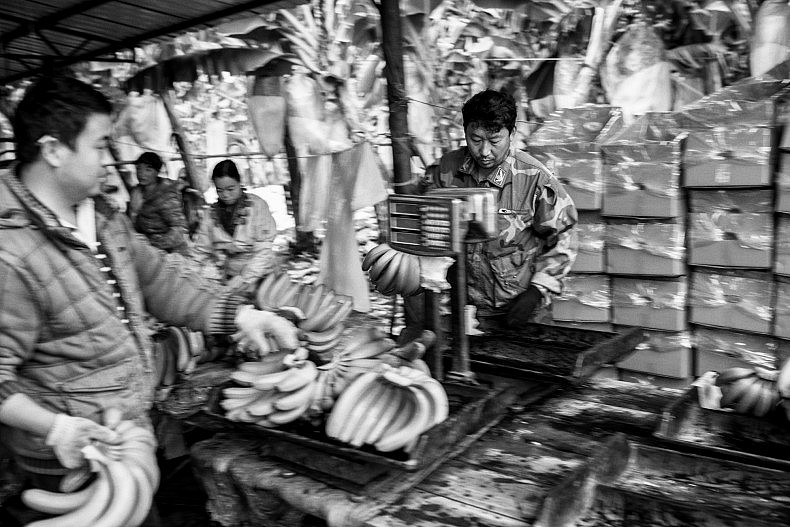
Soon-to-be-boxed bananas in Yunnan, destined for Shanxi. Photo by Gareth Bright.
Though perhaps this process was nothing out of the ordinary in the modern age of globalization and international trade, as we sat under the shade of a banana tree on the banks of the Lancang, it seemed incredible nevertheless.
Moving into the future, we resolved, we needed to be more cognizant of the incredible journeys our food underwent before reaching our tables. That, and to always wash our fruit.
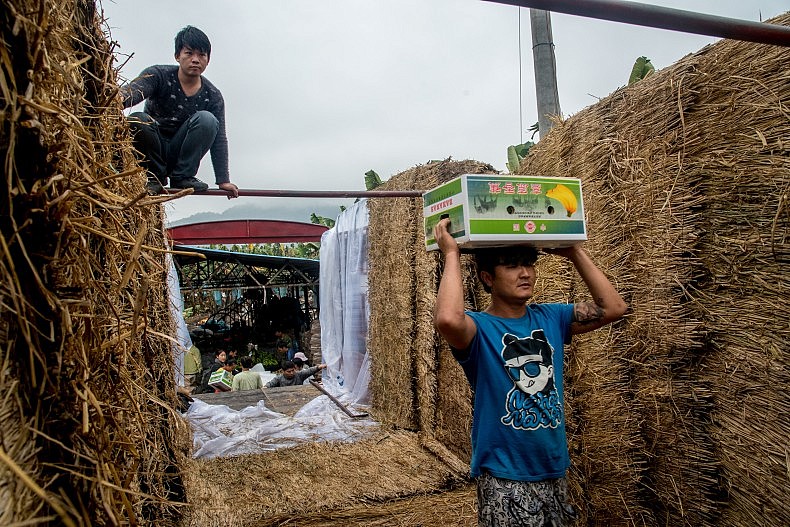
A worker loads packed boxes of bananas on a truck to be shipped to market. Photo by Luc Forsyth.
This piece originally appeared at A River’s Tail.













